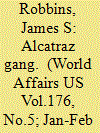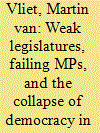|
|
|
Sort Order |
|
|
|
Items / Page
|
|
|
|
|
|
|
| Srl | Item |
| 1 |
ID:
128405


|
|
|
|
|
| Publication |
2014.
|
| Summary/Abstract |
Picture yourself locked "in a dimly lit, windowless concrete box, approximately nine feet long by four feet wide," with a bamboo mat and a bucket, one or both of your ankles locked in irons, left there like a caged animal. Now imagine spending two years there, alone-the isolation interrupted only by routine interrogation and occasional torture sessions, some lasting days-and you are getting close to describing the experiences of a handful of American prisoners of war whose North Vietnamese hosts had designated them as troublemakers. These were the men of Alcatraz. In all, more than three hundred and fifty American servicemen were being held captive by North Vietnam when US involvement ended in 1973. Few tales of American valor are as dramatic and gut-wrenching as those of the Vietnam-era POWs, some of whom were held for eight years, twice the length of US involvement in the Second World War. Defiant, by Alvin Townley, whose previous book chronicled the world of US Navy aviation, is the story of eleven of these captives whose leadership and resistance to their captors' treatment, including efforts to use them for propaganda purposes, caused the North Vietnamese so much trouble they were rounded up, blindfolded, and removed to a special prison they dubbed Alcatraz. They would spend two years there, isolated from the main group of American prisoners, segregated even from one another, forbidden to communicate amongst themselves, and tortured repeatedly for their refusal to capitulate. According to a camp functionary they nicknamed "Rabbit," the Alcatraz Eleven were the "darkest criminals who persist in inciting the other criminals to oppose the Camp Authority." We would call them heroes.
|
|
|
|
|
|
|
|
|
|
|
|
|
|
|
|
| 2 |
ID:
130053


|
|
|
|
|
| Publication |
2014.
|
| Summary/Abstract |
Demographic trends portend the rapid ageing of Developing Asia (DA), albeit at varying rates. This phenomenon, along with the need to extend coverage of social protection systems is likely to increase public and private expenditure on social protection, particularly for pensions and healthcare. This paper analyses the options for additional financing of social protection in DA. As total national and fiscal resources devoted to social protection increase, an important issue will be how the additional burden is shared between different sectors, and financing instruments. The paper, however, focuses on options to finance additional social protection expenditure. Three broad options are suggested: first, realizing efficiency gains in managing provident and pension fund organizations; second, design and service delivery innovations including better policy coordination and coherence within and amongst healthcare and pension programmes; third, developing capabilities to obtain resources from conventional and unconventional sources of budgetary revenue. The paper also stresses that complementary reforms in fiscal, labour market, financial and capital markets will be needed to manage rapid ageing in DA, and therefore the issue of ageing should be viewed as involving several economic and social arrangements, and not in isolation.
|
|
|
|
|
|
|
|
|
|
|
|
|
|
|
|
| 3 |
ID:
131811


|
|
|
|
|
| Publication |
2014.
|
| Summary/Abstract |
The sudden collapse of Mali's democracy in 2012 revealed the fragility of the state's legitimacy and authority. This article argues that the decay of democracy was linked to the weakness of the country's legislature. Malian MPs collectively failed to scrutinize an increasingly discredited executive and parliamentarians typically operated in isolation from the vast majority of citizens. As a result, rising levels of popular discontent were rarely channelled into the formal political process, and the interests that did enter the political arena were largely restricted to the personal support networks and electoral constituencies of individual MPs. The prevalence of these particularistic interests undermined collective parliamentary scrutiny of matters of national interest. By demonstrating the link between these failures and the collapse of Mali's democracy, this article contributes to the expanding body of literature examining the limited role of African parliaments in processes of democratic consolidation. In doing so it confirms the challenges that executive dominance poses to democratization, while highlighting the importance of representative legislatures to Africa's democracies.
|
|
|
|
|
|
|
|
|
|
|
|
|
|
|
|
|
|
|
|
|